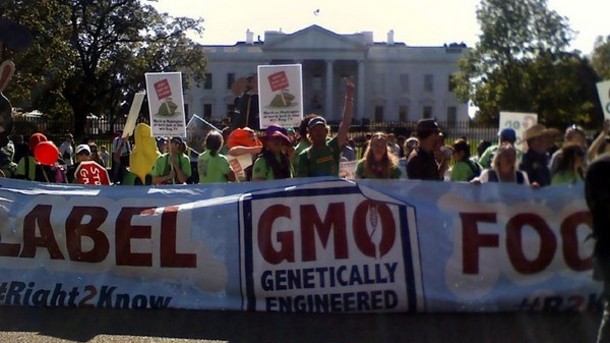A new disclosure rule issued today by the U.S. Department of Agriculture will not help consumers easily identify food that has been genetically engineered or that contains genetically modified ingredients (GMOs), according to Consumer Reports.

Consumer Reports has long been a supporter of mandatory on-package labeling of genetically engineered food, on the grounds that consumers have the right to know what is in their food and make informed choices based on what is disclosed on labels. But the new rule gives companies the option of providing disclosure via electronic means rather than providing on-package information. And it exempts from disclosure large swaths of the food supply, including soft drinks containing high fructose corn syrup from genetically engineered corn, and oil from GMO corn, soy and canola.
“The USDA’s new disclosure rule will likely keep many consumers in the dark about whether the food they buy has been genetically engineered,” said Michael Hansen, PhD, senior staff scientist at Consumer Reports. “No information is required on the package and manufacturers can get away with simply providing a QR code and phone number for consumers to learn more. Even consumers who have a smart phone and take the time to do that won’t necessarily get the full picture since many genetically engineered technologies and ingredients are exempt from disclosure.”
Under the rules issued today, companies don’t have to provide disclosure until January 2022. They are given the option of using on-package labels, but those labels must say “bioengineered food,” a term not commonly used in the marketplace,, rather than the more widely used term “GMO with which consumers are familiar.” Manufacturers are also given the option of providing disclosure through electronic means — via a scannable QR code, URL, or phone number.
“Not everyone has a smartphone or lives in an area with reliable Internet service,” said Jean Halloran, director of food policy initiatives for Consumer Reports. “And even for those who do, it’s inconvenient to have to scan every food you put into your grocery cart.”
Many GMO foods were exempted from the disclosure rules, including highly refined oils and many soft drinks, on the grounds that they don’t contain detectable DNA. However companies can keep track of whether a product is genetically engineered or not through basic recordkeeping. And consumers want to know if the food came from a genetically engineered source, regardless of the detectability DNA.
The vast majority of corn, soy, canola, and sugar beets grown in the U.S. are now genetically engineered, and they are often used as ingredients in processed foods. Consumer Reports had urged the USDA to require disclosure using easily recognized terms, such as “GE,” “genetic engineering,” or “GMO” and include highly processed ingredients.
Ninety-two percent of Americans believe that GMO foods – widely found in kitchens across the country – should be labeled before they’re sold, according to a 2014 nationally representative survey of 1,014 people conducted by Consumer Reports.
“The overwhelming majority of consumers want genetically engineered food to be clearly labeled,” said Hansen. “But this rule fails to give consumers the information they deserve. Consumers can, however, rely on labels such as “Non-GMO Process Verified” which will tell them if a food does not contain GMO ingredients.”



















This new “labeling” requirement was designed by big corporations who want to continue to promote genetically modified food even though most people don’t want it. The oligarchs win again. We the people will rise above this, figure out which foods to avoid regardless of big ag/food manufacturers. But why are we paying taxes to support the USDA when they don’t protect consumers????
Industry-led regulation, in other words completely ineffective.
The average American is still ‘the little guy’ and largely unable to fight and win against government and big business/Agriculture which is a sad commentary on our culture when you consider nations like India and Kyrgyzstan have been able to make such incredible progress! While it’s important to fight for truthful labeling, that fight is probably not going to be won in the US anytime soon. Therefore, I’d rather see our fighting efforts put to a more positive use through BIG, BOLD NON-GMO labeling that every consumer can quickly see and identify – put a big banner right across the top of every product and explain why non-GMO food is important right on or in the package. Find a way to fund educational programs, public/school/daycare/hospital meal programs, community gardens and bonuses for those using public assistance to buy food (double the buying power if you buy organic!). Keep it positive but not sensationalized, and simple enough for the average person to understand – a lot of people from all sectors of our society still don’t understand what GMO means! We also need to make Non-GMO products competitively priced – currently organics are only affordable for the wealthy not the masses.
Do the best you can to grow your own, or buy from a local store. I was talking to a customer service person at our local store. She was showing me that a product with the words “organic” it was not organic at all. It was the companies name. You see these multi billion $ companies know what we the consumers want and they are trying every schem they can to fool us. Guess what it’s not working anymore. it has for a long time. Now we have 24/7 social media…not just 24/7 news…Now there trying to do the best they can to say social media is not good. Let’s use it all in a healthy way! Thanks
We need to stop referring to this new law as “GMO labelling” law since this is not what it is. Labelling implies clear, text labelling right on the package. As a movement in favour of transparency, accurate labels, and food democracy, we are doing ourselves a disservice by continuing to refer to this flimsy and fake new disclosure law as “GMO labelling”